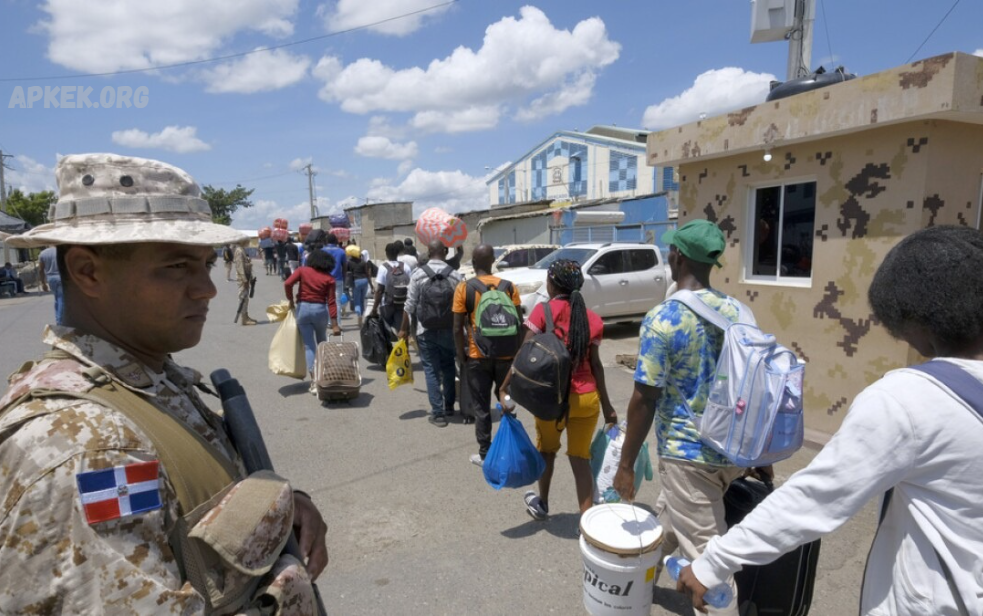The Dominican Republic closed all its borders—land, air, and sea—with Haiti, citing urgent concerns over a canal being built on the Haitian side of the shared Massacre River. Dominican authorities argue that the canal could divert essential water and threaten their agricultural ecosystems, igniting a direct diplomatic standoff rooted in resource control.
The border closure affected the lives of thousands on both sides. Trade, daily commuting, and humanitarian aid were all brought to a standstill, with markets and supply chains disrupted almost overnight. Families split across the two countries faced sudden separations, while businesses that relied on cross-border movement struggled to cope with the economic shock. Despite repeated calls for dialogue, both nations remained steadfast in defending their national interests.
This standoff reflects deeper historical and political tensions between Haiti and the Dominican Republic, where issues of resource management, migration, and sovereignty frequently come to the surface. As regional leaders and international observers urge a peaceful resolution, the situation remains fragile, with hopes pinned on diplomacy to restore stability and reopen vital lines of connection between the two nations.
Dominican Republic Shuts All Borders with Haiti Amid Canal Dispute
In a major escalation of diplomatic tensions, the Dominican Republic has closed all its borders with Haiti due to a growing dispute over the construction of a canal on the shared Massacre River. The Dominican government expressed serious concerns that the Haitian-led canal project could divert crucial water flow from the river, potentially harming Dominican farmlands and threatening local ecosystems. This decision marks one of the most severe actions taken between the two nations in recent years, signaling a breakdown in negotiations and growing mistrust between the neighbors.
The border shutdown includes all land crossings, as well as air and maritime routes, effectively halting the movement of goods, services, and people between the two countries. This has had immediate and far-reaching consequences, particularly for families divided across the border and for businesses that rely on cross-border trade. Humanitarian organizations have also raised alarms about the impact on vulnerable communities, especially in areas already struggling with poverty and limited access to resources.
At the heart of the conflict lies a deeper historical struggle over territory, natural resources, and national sovereignty. While international observers and regional leaders have urged both sides to return to dialogue and seek a peaceful resolution, the standoff remains tense. The coming weeks will be crucial in determining whether diplomacy can prevail—or if the crisis will further destabilize relations on the island of Hispaniola.
Tensions Rise as Canal Conflict Triggers Border Closure
The long-standing friction between the Dominican Republic and Haiti reached a new peak in 2025, as a dispute over a canal project led the Dominican government to close all borders with its western neighbor. The conflict centers around Haiti’s construction of a canal on the Massacre River, a waterway shared by both nations. Dominican authorities argue that the project threatens to divert water crucial for agriculture and local communities, raising concerns about environmental impact and fairness in shared resource management.
The sudden border closure, affecting land, air, and sea routes, has disrupted daily life for thousands. Cross-border trade came to a halt, leaving markets without essential goods and damaging livelihoods on both sides. Families separated by the border were left stranded, while migrant workers, traders, and students faced uncertainty. Tensions also rose within local communities near the border, as nationalistic sentiments grew stronger and mistrust deepened.
Beyond the canal itself, the crisis highlights deeper issues between Haiti and the Dominican Republic, including disputes over migration, economic imbalance, and historical grievances. As international mediators call for calm and cooperation, both countries remain firm in their positions. The hope now lies in finding a diplomatic path forward before the situation worsens and long-standing divides become even harder to bridge.
Massacre River Dispute Leads to Full Border Lockdown
The Dominican Republic has taken the unprecedented step of fully closing its borders with Haiti, a move prompted by a deepening dispute over a canal being constructed on the Massacre River. This river, which marks part of the boundary between the two nations, has become the center of a heated argument after Haiti began building a canal to divert its waters. Dominican officials claim the project violates previous agreements and could seriously affect water access and environmental balance on their side of the border.
As a result, the Dominican government ordered a complete shutdown of all land, air, and maritime borders, effectively freezing movement between the two countries. The decision has had swift and severe consequences: trade has stopped, border markets are empty, and many families who live and work across the border are left in limbo. The closure has also sparked protests and raised concerns about food shortages in some Haitian communities that heavily rely on Dominican imports.
This crisis is not just about water—it’s about sovereignty, historical tension, and a fragile relationship shaped by decades of mistrust. While there have been calls from international observers for both sides to return to dialogue, the atmosphere remains tense. The border lockdown underscores how environmental issues can quickly escalate into full-blown political standoffs when underlying issues remain unresolved.
Dominican-Haitian Relations Strain Over Water Rights
In 2025, relations between the Dominican Republic and Haiti took a sharp downturn following a heated dispute over the use of shared water resources. At the center of the conflict is the Massacre River, a crucial waterway that runs along part of the border between the two countries. Tensions flared when Haiti resumed construction of a canal aimed at diverting water from the river to irrigate its northern farmland. The Dominican government strongly opposed the project, arguing that it would reduce water flow to its own agricultural zones and violate long-standing agreements between the two nations.
The disagreement quickly escalated into a national crisis. In response, the Dominican Republic closed all its borders with Haiti, halting trade, transportation, and daily movement between the two countries. This move disrupted countless lives—particularly those of border communities that depend on cross-border commerce, work, and family ties. Economic losses mounted quickly, and the humanitarian impact began to draw concern from international organizations and neighboring nations.
What started as a local infrastructure project has exposed the fragile state of Dominican-Haitian relations. Beyond the immediate conflict over water rights, this crisis reflects deeper issues rooted in history, migration pressures, and economic disparity. With both sides holding firm, efforts at negotiation are urgently needed to prevent further escalation and to find a fair, lasting solution for managing shared natural resources.
Border Closure Disrupts Trade, Travel, and Daily Life
The Dominican Republic’s full border closure with Haiti in 2025 has sent shockwaves through both nations, deeply affecting trade, travel, and the everyday lives of people on both sides of the island. What began as a disagreement over a canal being constructed by Haiti on the shared Massacre River has now evolved into a broader humanitarian and economic crisis. With the border sealed by land, air, and sea, thousands of people who relied on the daily flow of goods, services, and mobility are now facing harsh disruptions.
For border communities, the closure has brought sudden hardship. Traders who once crossed daily to sell produce and supplies have seen their livelihoods vanish overnight. Haitian markets, heavily dependent on Dominican imports, are experiencing shortages and price spikes. Families split between the two countries are unable to reunite, and students and workers are stuck in limbo with limited options. Transport routes remain paralyzed, and aid deliveries have slowed, raising concerns among humanitarian groups.
The consequences of this political move extend far beyond government policies or national interests—they are being felt in homes, streets, and local economies. Until a resolution is found, the border remains more than just a dividing line; it’s now a symbol of rising tension and the human cost of unresolved disputes.
Frequently Asked Questions
What are the main concerns of the Dominican Republic regarding the canal?
The Dominican Republic is concerned that the canal will divert water away from their side, reducing irrigation supplies, damaging farmland, and affecting local ecosystems.
Have there been any diplomatic efforts to resolve the dispute?
Yes, regional leaders and international organizations have urged both countries to return to negotiations, but progress has been slow amid strong national positions.
How long is the border expected to remain closed?
There is no clear timeline yet, as the situation depends on ongoing diplomatic talks and potential agreements between the two governments.
Are there any humanitarian concerns due to the border closure?
Yes, aid delivery has been disrupted, and vulnerable populations near the border face increased risks due to limited access to food, medical care, and supplies.
What could be the long-term impact of this dispute on Dominican-Haitian relations?
If left unresolved, the conflict could deepen mistrust and exacerbate economic and social conditions, making future cooperation on shared resources and border management more challenging.
Conclusion
The closure of the Dominican Republic’s borders with Haiti over the canal dispute underscores the critical role that natural resources, such as water, can play in fueling tensions between neighboring countries. While the immediate impact has been disruptive, affecting trade, families, and daily life, the deeper challenge lies in addressing longstanding issues of cooperation, trust, and shared responsibility. Finding a peaceful and fair resolution will require open dialogue, mutual respect, and a commitment to protecting both nations’ interests. Only through collaboration can the Dominican Republic and Haiti move beyond this crisis and build a more stable and cooperative future together.

